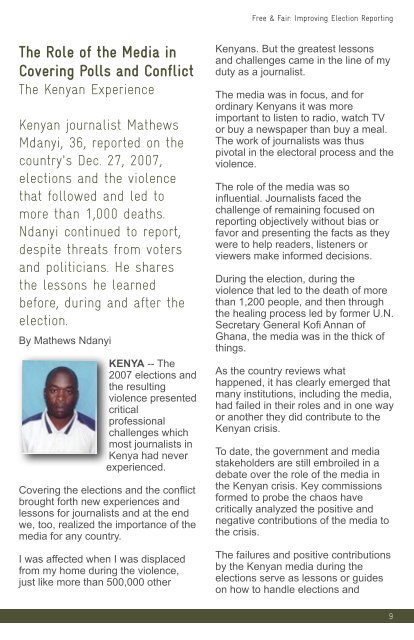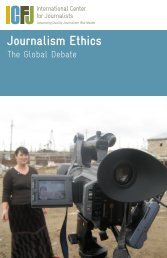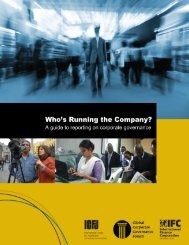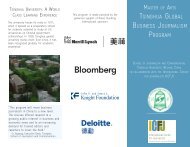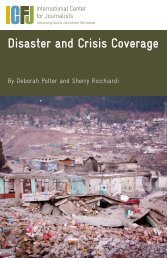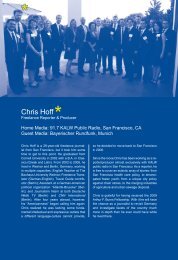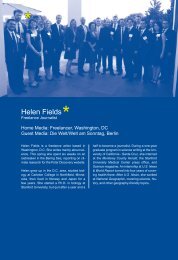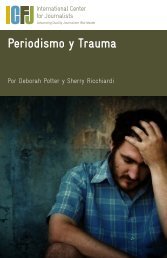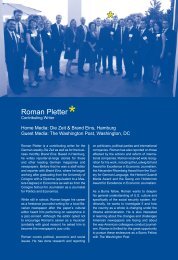Download PDF - International Center for Journalists
Download PDF - International Center for Journalists
Download PDF - International Center for Journalists
Create successful ePaper yourself
Turn your PDF publications into a flip-book with our unique Google optimized e-Paper software.
Free & Fair: Improving Election Reporting<br />
The Role of the Media in<br />
Covering Polls and Conflict<br />
The Kenyan Experience<br />
Kenyan journalist Mathews<br />
Mdanyi, 36, reported on the<br />
country's Dec. 27, 2007,<br />
elections and the violence<br />
that followed and led to<br />
more than 1,000 deaths.<br />
Ndanyi continued to report,<br />
despite threats from voters<br />
and politicians. He shares<br />
the lessons he learned<br />
be<strong>for</strong>e, during and after the<br />
election.<br />
By Mathews Ndanyi<br />
KENYA -- The<br />
2007 elections and<br />
the resulting<br />
violence presented<br />
critical<br />
professional<br />
challenges which<br />
most journalists in<br />
Kenya had never<br />
experienced.<br />
Covering the elections and the conflict<br />
brought <strong>for</strong>th new experiences and<br />
lessons <strong>for</strong> journalists and at the end<br />
we, too, realized the importance of the<br />
media <strong>for</strong> any country.<br />
I was affected when I was displaced<br />
from my home during the violence,<br />
just like more than 500,000 other<br />
Kenyans. But the greatest lessons<br />
and challenges came in the line of my<br />
duty as a journalist.<br />
The media was in focus, and <strong>for</strong><br />
ordinary Kenyans it was more<br />
important to listen to radio, watch TV<br />
or buy a newspaper than buy a meal.<br />
The work of journalists was thus<br />
pivotal in the electoral process and the<br />
violence.<br />
The role of the media was so<br />
influential. <strong>Journalists</strong> faced the<br />
challenge of remaining focused on<br />
reporting objectively without bias or<br />
favor and presenting the facts as they<br />
were to help readers, listeners or<br />
viewers make in<strong>for</strong>med decisions.<br />
During the election, during the<br />
violence that led to the death of more<br />
than 1,200 people, and then through<br />
the healing process led by <strong>for</strong>mer U.N.<br />
Secretary General Kofi Annan of<br />
Ghana, the media was in the thick of<br />
things.<br />
As the country reviews what<br />
happened, it has clearly emerged that<br />
many institutions, including the media,<br />
had failed in their roles and in one way<br />
or another they did contribute to the<br />
Kenyan crisis.<br />
To date, the government and media<br />
stakeholders are still embroiled in a<br />
debate over the role of the media in<br />
the Kenyan crisis. Key commissions<br />
<strong>for</strong>med to probe the chaos have<br />
critically analyzed the positive and<br />
negative contributions of the media to<br />
the crisis.<br />
The failures and positive contributions<br />
by the Kenyan media during the<br />
elections serve as lessons or guides<br />
on how to handle elections and<br />
9


